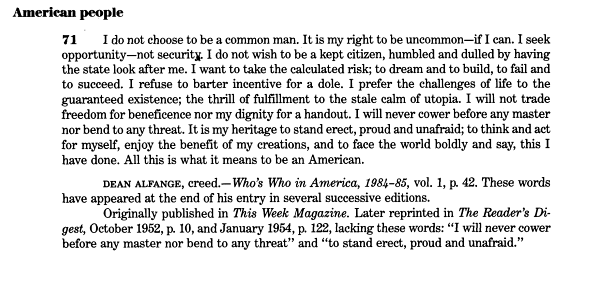The difference between the final lines of the OP's quotation ("This, with God’s help, I have done/All this is what it means/To be an Entrepreneur.”) and the quotation from Dean Alfange cited in Andrew Leach's answer ("this I have done. All this is what it means to be an American") greatly intrigued me.
So I ran a couple of Google Books searches for those endings. The results indicate that the entrepreneur-exalting wording was an alteration introduced and adopted by the Board of Trustees of the International Entrepreneurs' Association (IEA) in April 1976. This evident from the following combined snippet from Chase Revel, The Truth About Small Business Profits (1979):
I do not wish to be a kept citizen, humbled and dulled by having the state look after me. I want to take the calculated risk; to dream and to build, to fail and to succeed. I refuse to barter incentive for a dole; I prefer the challenges of life to the guaranteed existence; the thrill of fulfillment to the stale calm of Utopia. I will not trade freedom for beneficence nor my dignity for a handout. It is my heritage to stand erect, proud and unafraid; to think and act for myself, to enjoy the benefit of my creations and to face the world boldly and say: to face the world boldly and say: This, with God's help, I have done. All this is what it means to be an Entrepreneur." Adopted by the Board of Trustees of International Entrepreneurs' Association (IEA) April 1976. Used with IEA's permission.
Dean Alfange's original wording ended in "this I have done. All this is what it means to be an American," as is clear from its inclusion in multiple sources from the 1950s and 1960s, including in Scene: The International East-West Magazine, volume 4 (1952), which attributes the quotation to "DEAN ALFANGE. from the Congressional Record." Members of Congress admired it so much that they put it in the 1952 Congressional Record twice, at page A-18 and again at page A-349.
I also discovered that entrepreneurs aren't alone in bowdlerizing Alfange's wording to aggrandize their particular group. We also have this version from The Fortnightly Review of the Chicago Dental Society, volume 60 (1970):
I will not trade freedom for beneficence, nor dignity for a handout. It is my heritage to think and act for myself; enjoy the benefit of my creations; and to face the world boldly and say, "This I have done". All this is what it means to be an American and a member of the dental profession.—Elmer Ebert.
And this from The State of American Agriculture: Hearings before the Committee on Agriculture, Nutrition and Forestry, United States Senate (1978):
It is my heritage to stand erect, proud and unafraid, to think and act for myself, enjoy the benefit of my creations and to face the world boldly and say : "This I have done." All this is what it means to be an AMERICAN FARMER!
And the New York State Bar Journal (1962)—among other sources—adds a little sexist fillip to the creed:
It is my heritage to stand erect, proud and unafraid, to think and act for myself, enjoy the benefit of my creations and to face the world boldly and say: "This — I have done!" All this is what it means to be a MAN: all this is what it means to be — an AMERICAN!
But unlike the dentists and the farmers and the lawyers, the entrepreneurs wrote "American" completely out of the creed, as well as writing "God" into it. I wonder how Dean Alfange felt about that (he died in 1989).
A side note on 'entrepreneur'
According to Merriam-Webster's Eleventh Collegiate Dictionary (2003), entrepreneur didn't enter English until 1852; Thomas Paine died in 1809. I don't recall entrepreneur becoming an ideological totem word among especially pro-business politicians until Ronald Reagan's presidency in the 1980s, but evidently the IEA was already preparing the way for its ascendancy back in the 1970s.

